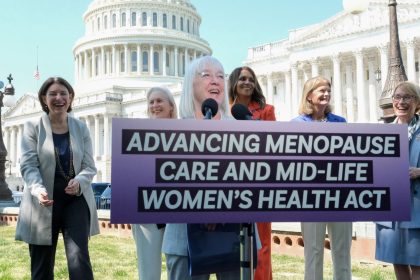By 2030, Nearly Half of All US Adults Will Be Obese, Experts Predict

A tidal wave of fat, and the ailments that come with it, now appears virtually inevitable in the United States.
New research finds that by 2030, nearly half of American adults — 49.2% to be exact — will be obese. In every single state, no fewer than 35% of adults will have a body mass index of at least 30, the threshold that defines obesity.
New year’s resolutions aside, this is not about whether you’ll fit into your skinny jeans a decade from now. Body mass index, a measure of fatness based on a person’s height and weight, has its limitations as a predictor of personal health. But in large populations where rates of obesity are higher, people tend to be sicker, live shorter lives, and incur steeper health care expenses.
And that means the new study results are a harbinger of pretty poor American health.
Even worse: As the nation continues to accumulate fat, nearly 1 in 4 U.S. adults will have “severe obesity.”
Defined as having a BMI of 40 or above, severe obesity will become about as common in 2030 as regular obesity was in the 1990s. Where Americans were already obese, the generation behind them is expected to become severely obese — and their risk of joint and back problems, diabetes, cardiovascular disease, certain cancers and early death will be even higher.
The findings were published in this week’s edition of the New England Journal of Medicine.
Public health researchers at Harvard and George Washington University made these projections by applying established weight trends to Americans across the lifespan and across the map. To hone in on states’ obesity rates, they combed through existing data and corrected it to account for the fact that people routinely lie to researchers about their weight. Then, they used each state’s history of weight gain to forecast its future.
The resulting projections represent a stark increase from current obesity rates. In 2015-2016, the last period for which there are reliable figures from the Centers for Disease Control and Prevention, 39.8% of adult Americans were obese. That translates into 93.3 million people with a condition that the American Medical Association calls a disease state.
The weight of these grim statistics is not distributed evenly. For instance, 21.1% of U.S. men are projected to be severely obese in 2030, along with 27.6 % of U.S. women. In fact, severe obesity by then will make up the largest single weight category for women.
In addition, severe obesity will affect 23.4% of non-Latino white adults, 24.5% of Latino adults and 31.7% of non-Latino black Americans.
Income matters too, with severe obesity heavily clustered at the bottom of the economic ladder. It is projected to affect 21.6% of adults in households with incomes above the 2030 equivalent of $50,000 and 31.7% of adults in households making $20,000 or less per year.
States like California, Colorado and Hawaii long appeared to buck the national trend of inexorable weight gain. But by 2030, they too are expected to have populations in which more than one in three adults are obese.
In a cluster of southern states dubbed the “stroke belt,” the situation is more dire. Close to six in 10 adults in Alabama, Arkansas, Louisiana, Mississippi and Oklahoma are expected to be obese in 2030, and the proportion of adults in those states who are severely obese is projected to top 30%.
Zachary J. Ward, lead author of the study, said the increase in the nation’s obesity rates has shown few signs of slowing since the 1980s. Despite decades of hand-wringing, fat shaming and obesity-prevention campaigns, no state whose population has remained steady has succeeded in stabilizing its weight, much less reducing obesity.
The failure of obesity-prevention efforts aimed at children, in fact, is helping to drive these continued increases in adult obesity, Ward said.
An earlier simulation exercise by his research group projected that 57% of American kids alive in 2017 will be obese by the time they’re 35. And the evidence is clear that for at least several decades after that, an adult’s weight typically continues to climb.
The result: Not only is obesity established earlier, driving population rates upward. When it sets in in early midlife, the stage is set for more people to develop severe obesity.
By 2030, that escalation of weight gain will have the curious result of reducing the proportion of Americans who are expected to be considered overweight, defined as having a BMI between 25 and 29.9. (A BMI between 18.5 and 24.9 is considered a healthy weight.)
While a reduction in overweight Americans might be seen an an encouraging sign, the reality is far less positive, Ward said. Weight gain has become so rapid that more adults will pass quickly through the overweight phase and proceed directly to obesity — or worse, to severe obesity.
The disparities in obesity along gender, ethnic, economic and geographic lines mean that “no one strategy is going to solve this problem,” Ward said.
What works to stabilize weight in Latinos may differ from what works in African-Americans. In Arkansas and Oklahoma, public health experts might look for ways not only to prevent obesity, but to forestall the expansion of severe obesity. Many of the cultural and environmental factors that contribute to weight gain in low-income Americans are likely different than those that promote weight gain in higher-income households.
In any case, it’s clear that simply exhorting people to lose weight is not enough, Ward said. With obesity threatening to become the new normal among American adults, public health experts might do well to redefine what counts as success.
“Prevention is key,” Ward said. But even for people with obesity, each step up the BMI ladder increases the risk of serious health problems. At this point, helping the obese to stabilize their weight, whatever it is, might be the best way to improve Americans’ health prospects, said Ward.
“That could still be a public health victory if we could get people to stop gaining more weight,” he said.
———
©2019 Los Angeles Times
Visit the Los Angeles Times at www.latimes.com
Distributed by Tribune Content Agency, LLC.
























